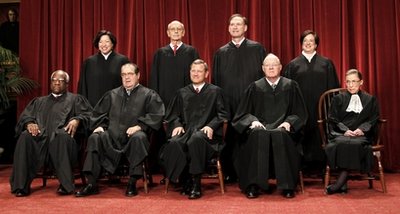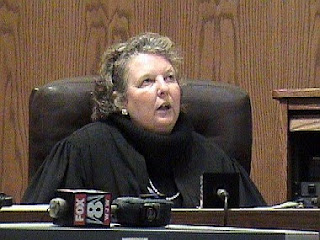JUSTICE WILL BE SERVE

The Supreme Court Justices of the United States sit for a formal group photo in the East Conference Room of the Supreme Court in Washington on October 8, 2010. The Justices are (front row from left) Clarence Thomas, Antonin Scalia, John G. Roberts (Chief Justice), Anthony Kennedy, Ruth Bader Ginsburg; (back row from left) Sonia Sotomayor, Stephen Breyer, Sameul Alito and Elena Kagan, the newest member of the court. On my web page I'm going to be talking about Judges. Juvenile Judges and Criminal Judges and Supreme Court Judges I think they are the best. They do anything and mostly everything they want. Most importantly, they are fair in all ways. I'm going to be giving u updates of Judges and how the judicial system work. Trust me it's not like T.V Judges it's a whole different thing.
Monday, August 30, 2010
Thursday, August 19, 2010
Monday, August 16, 2010
Justice Elena Kagan
Sunday, August 15, 2010
U.S District Federal Judge Susan Bolton

PHOENIX - U.S. District Judge Susan Bolton will be deciding the fate of Arizona's immigration law. Many that know her and have tried cases before her say she is tough but impartial.
Judge Bolton how has six lawsuits against the state to decide -- that includes the federal government's challenge.
This is what we found out about her. Bolton was a Superior Court judge in Maricopa County for 11 years, between 1989 and 2000. She is well regarded among both Democrats and Republicans.
In 2000, she was recommended by Arizona Senator Jon Kyl, a Republican, for the federal bench. And she was nominated by then-President Clinton.
Some who have reported on Judge Bolton's cases expect her to be fair and thorough.
"She's thought of as very thoughtful, she also seems to be willing to work under a tight schedule, which given the July 29th date for this law to take effect is going to be critical," says Howard Fischer with Capitol Media Services.
But Judge Bolton is before the law and is set to take in effect. She is scheduled to hear the first of six lawsuits against the law on July 15. Judge Susan Bolton block controversial parts of Arizona immigration law. Great Seal of the State of Arizona Image via Wikipedia. Today’s ruling by Judge Bolton prevents police officers check the immigration status of a person, while other laws imposed. It has the features, the immigrants in their documentation practice that require to identify themselves blocked. Hearing the arguments of lawyers from the Department of Justice, ACLU and the defendants, the State of Arizona: “Today, a stay led to enact before any further hearings, decide on the total bill will be.
Rod Blagojevich Federal Charges "will he walk"
 COUNTS: Racketeering (Count 1); conspiracy to commit racketeering (Count 2), wire fraud (Counts 3, 4, 5, 6, 7. 8, 9, 10, 11, 12, and 13); attempted extortion (Counts 14, 15, 19, and 22); conspiracy to commit extortion (Counts 17 and 21); bribery (Counts 16 and 20); conspiracy to commit bribery (Counts 18 and 23); and making false statements to the government (Count 24) he also charge with trying to give away the president Barack Obama seat to another senate without consent.
COUNTS: Racketeering (Count 1); conspiracy to commit racketeering (Count 2), wire fraud (Counts 3, 4, 5, 6, 7. 8, 9, 10, 11, 12, and 13); attempted extortion (Counts 14, 15, 19, and 22); conspiracy to commit extortion (Counts 17 and 21); bribery (Counts 16 and 20); conspiracy to commit bribery (Counts 18 and 23); and making false statements to the government (Count 24) he also charge with trying to give away the president Barack Obama seat to another senate without consent.Saturday, July 17, 2010
WHAT HAPPENS AT A TRIAL

WHAT HAPPENS AT A ARRAIGNMENT

3. This proceeding is called an arraignment. The principal purpose of arraignment is for you to enter a plea to the charges. Before taking your plea, I will advise you of your rights and options. I will advise you of the offense(s) you are charged with and will give you a copy of the criminal complaint or citation if you do not already have one. At that point, you will enter a plea to the charges.
4. You have the right to:
* Plead not guilty;
* A trial on the charge(s);
* Be released on bail, if you are still in custody;
* The assistance of an attorney at all stages of the case. If you cannot afford to hire an attorney, the court may appoint an attorney to represent you if you qualify for such representation.
* See and hear the witnesses at trial and to cross-examine them or ask them questions;
* To present evidence in your own behalf;
* To have the court issue subpoenas for you directing your witnesses to be in court for trial and to testify;
* To remain silent and not be forced to incriminate yourself. That means that you are never required to testify. And,
* To be presumed innocent until the prosecution proves your guilt beyond a reasonable doubt. You are not required to prove anything. The prosecution must prove the charge(s) and must do so beyond a reasonable doubt if the case goes to trial.
5. Do you understand these rights? Do you have any questions about these rights? [If the court is uncertain that the defendant understands any of these rights, the court may ask the defendant to explain what had just been stated: e.g. “Could you please explain to me how you understand what I have just told you? I want to be certain that you are clear about what I have said.”]
6. [If the defendant does not have counsel, you must determine whether the defendant is entitled to court-appointed counsel. ]
Do you understand that you have the right to have an attorney represent you and that if you cannot afford an attorney, one may be appointed for you if you qualify for such representation?
[If no, rephrase the question.]
[If yes, ask]: Can you afford to hire an attorney or consult with an attorney for advice?
[If yes, determine whether the defendant wants an attorney]: Do you want to hire or consult with an attorney?
[If yes, reset the arraignment for a week later to allow the defendant a reasonable opportunity to hire an attorney or consult an attorney for advice.]
[If no, determine whether the defendant is making a knowing, intelligent, and voluntary waiver of counsel by asking the following questions]:
* Do you understand that if you are convicted you may be sentenced to jail?
* Do you understand the consequences of waiving counsel?
* Is your decision to waive counsel made voluntarily, without threats or coercion?
* Do you wish to waive your right to an attorney and represent yourself?
[If yes to all questions, have the defendant sign a Waiver of Counsel form, Criminal Form 9-401A, and continue with the arraignment.]
[If no, ask]: Do you wish to request a court-appointed attorney?
[If yes, you must make an indigency determination and appoint counsel if indigent.]
[If no, you must determine whether the defendant is making a knowing, intelligent, and voluntary waiver of counsel by asking the following questions]:
* Do you understand that if you are convicted you may be sentenced to jail?
* Do you understand the consequences of waiving counsel?
* Is your decision to waive counsel made voluntarily, without threats or coercion?
* Do you wish to waive your right to an attorney and represent yourself?
[If yes to all questions, have the defendant sign a Waiver of Counsel form, Criminal Form 9-401A, and continue with the arraignment.]
7. Have you received a copy of the criminal complaint or citation? [If no, provide the defendant a copy.]
8. You are charged with .
[Read the ordinance(s) aloud.]
9. Do you understand the charge(s)?
10. [NOTE: If the charge is DWI or Aggravated DWI, you must inform the defendant of the maximum and mandatory minimum penalties for a first, second, and third offense
Subscribe to:
Posts (Atom)


